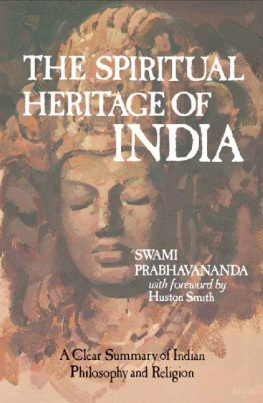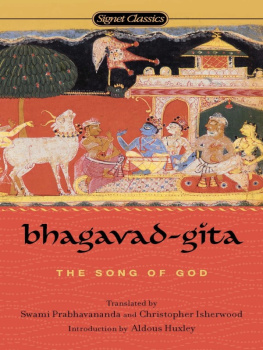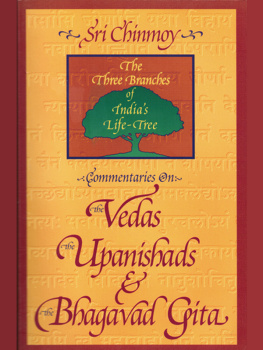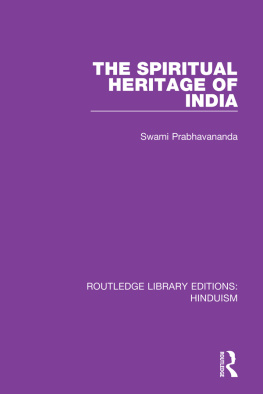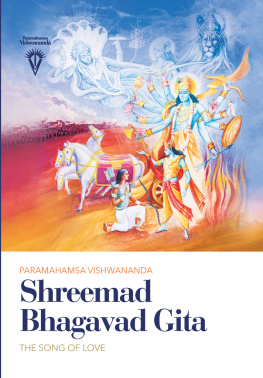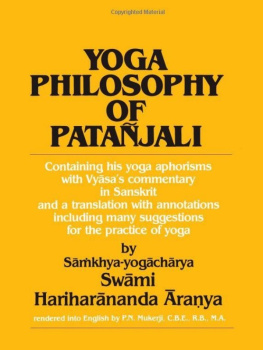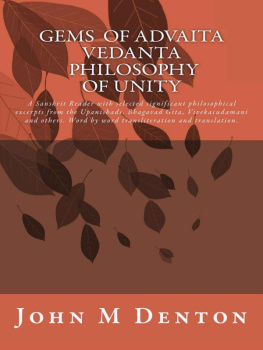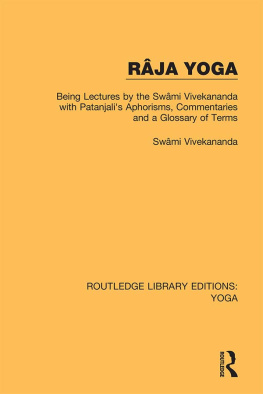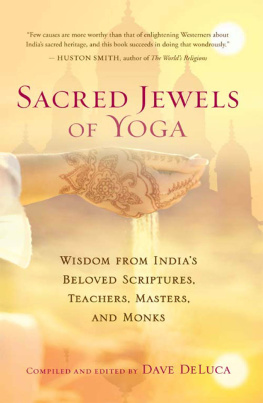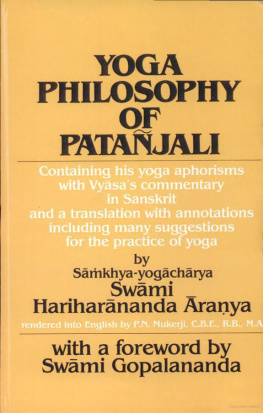Swami Prabhavananda - The Spiritual Heritage of India
Here you can read online Swami Prabhavananda - The Spiritual Heritage of India full text of the book (entire story) in english for free. Download pdf and epub, get meaning, cover and reviews about this ebook. year: 1979, publisher: Vedanta Press, genre: Religion. Description of the work, (preface) as well as reviews are available. Best literature library LitArk.com created for fans of good reading and offers a wide selection of genres:
Romance novel
Science fiction
Adventure
Detective
Science
History
Home and family
Prose
Art
Politics
Computer
Non-fiction
Religion
Business
Children
Humor
Choose a favorite category and find really read worthwhile books. Enjoy immersion in the world of imagination, feel the emotions of the characters or learn something new for yourself, make an fascinating discovery.
- Book:The Spiritual Heritage of India
- Author:
- Publisher:Vedanta Press
- Genre:
- Year:1979
- Rating:5 / 5
- Favourites:Add to favourites
- Your mark:
- 100
- 1
- 2
- 3
- 4
- 5
The Spiritual Heritage of India: summary, description and annotation
We offer to read an annotation, description, summary or preface (depends on what the author of the book "The Spiritual Heritage of India" wrote himself). If you haven't found the necessary information about the book — write in the comments, we will try to find it.
The Spiritual Heritage of India — read online for free the complete book (whole text) full work
Below is the text of the book, divided by pages. System saving the place of the last page read, allows you to conveniently read the book "The Spiritual Heritage of India" online for free, without having to search again every time where you left off. Put a bookmark, and you can go to the page where you finished reading at any time.
Font size:
Interval:
Bookmark:

HERITAGE OF
INDIA
Original Works
VEDIC RELIGION AND PHILOSOPHY
THE ETERNAL COMPANION (LIFE AND TEACHINGS OF SWAMI BRAHMANANDA)
THE SERMON ON THE MOUNT ACCORDING TO VEDANTA
RELIGION IN PRACTICE
YOGA AND MYSTICISM
Translations
THE WISDOM OF GOD (SRIMAD BHAGAVATAM)
SHANKARAS CREST-JEWEL OF DISCRIMINATION (WITH CHRISTOPHER ISHERWOOD)
THE UPANISHADS (WITH FREDERICK MANCHESTER)
THE SONG OF GOD! BHAGAVAD-GITA (WITH ISHERWOOD)
HOW TO KNOW GOD, THE YOGA APHORISMS OF PATANJALI (WITH ISHERWOOD)
SWAMI PREMANANDA: TEACHINGS AND REMINISCENCES
THE SPIRITUALHERITAGE OF
INDIA SWAMI
with foreword by
Huston Smith

This book is copyright under the Berne Convention
ALL RIGHTS RESERVED
Library of Congress Catalog Number 63-10517
If you wish to learn more about the teachings within
this book, write to the Secretary, Vedanta Society of
Southern California, 1946 Vedanta Place, Hollywood CA
90068-3996. Or phone 213/465-7114, fax 213/465-9568.
Around the middle of this century Arnold Toynbee predicted that at its close the world would still be dominated by the West, but that in the twenty-first century India will conquer her conquerors. Preempting the place that is now held by technology, religion will be restored to its earlier importance and the center of world happenings will wander back from the shores of the Atlantic to the East where civilization originated five or six thousand years ago. His prediction provides an exceptionally forceful rationale, if one were needed, for reissuing the book in hand. For The Spiritual Heritage of India is one of the most useful summaries in print of the tradition Toynbee saw as destined to figure prominently in the long range human future.
The spiritual heritage of India is one of the worlds standing miracles. It would rank among its greatest human achievements were it not that achievement isnt really the right word. It is more like a reception the opening of a people to receive, through inspiration, the Breath of the Eternal. For the outbreathing of the Eternal is what India has taken truth to be see infra, p. 28. We know that Hinduism is a label affixed by outsiders. Long ago, people to the west of the Indus River mispronounced its name and called those who lived on it or to its other side Hindus, and in time Hinduism came to be used for their beliefs and practices. The Indians themselves knew no such word. There was no need for them to think of the truth by which they lived as other than the sanatana dharma, the Eternal Truth. It was Truth Itself truth that had become incarnate in the tradition that sustained them.
How the incarnation was effected is itself an interesting point. In the West we tend to think of knowledge as cumulative: bits of information get joined into bodies of information that can grow indefinitely. India recognizes a kind of knowledge that fits this model, but she considers it lower knowledge knowledge that is gained by reason and the senses playing over objective, finite particulars. Higher knowledge (paravidya) proceeds differently. Or rather, it doesnt proceed at all, for it enters history full-blown. It is futile to ask when this higher knowledge first appeared, for India has no notion of absolute beginnings beginnings require time, and time for India is not absolute. The most we can say is that when a new cosmic cycle opens there are souls waiting in the wings, so to speak, with the higher wisdom already in store. Who these souls are is not a genetic accident: India has no place for chance or accident the law of karma precludes it. The men and women who are born wise on the morning of a new creation are so because, though the world they enter is young, they themselves are not. Their jivas (individual psyches) having been held over from preceding cosmic cycles, they are already old souls old chronologically, to be sure, but more importantly in experience. Specifically they are yogis and yoginis who used their preceding lives to cultivate what might be regarded as a kind of night sight the night vision of the spirit by which fixed stars of eternity can be seen in broad daylight. Adepts in such vision, these seers stand poised on the brink of their final liberation when the new cycle begins. Their concluding legacy to the phenomenal world is to impregnate the new cycle with reflective knowledge of the truth they have assiduously shepherded. Keeping in touch with this truth through meditation, these rishis (seers) transmit it orally, direct from guru to disciple, until eventually their oral tradition gets committed to writing. In India the texts that result are the Vedas.
If we see the Vedas in this light, as apertures through which the Infinite entered conscious human awareness in South Asia in the present cosmic cycle, what word of the Infinite do the Vedas impart?
First the warning that on this topic words are unequal to their task. They can be useful, of course, or the Vedas themselves would not have been written, but a fundamental Vedic teaching concerns the limitations of words themselves when directed towards ultimates. Sooner or later these ultimates phase beyond language entirely. Neti, neti, not this, not this; the map is not the terrain, the menu is not the meal the Vedas never tire of repeating this basic point. In this kind of knowing, words do not cause understanding; at best they occasion it: from spirit to spirit communion leaps. The word Upanishads, denoting the culminating sections of the Vedas, makes this point in its very etymology. Deriving from roots which when conjoined mean to approach (upa) with utter (ni) firmness to loosen and destroy (sad) spiritual ignorance, it warns the reader right off that the topics he is about to encounter call for more than book learning. For their province is that higher mathematics of the human spirit where knowing merges with being. Upanishadic truth is so subtle, so abstruse, that purely objective, rational intellects are likely to miss it entirely off such intellects it rolls like water off oil. Only when discerned in a life that is living it a life that incarnates it in its outlook, moods, and conduct does truth of this order become fully convincing. It is like art. There comes a time when every master musician must say to his pupil, Dont bother with what I say. Just watch how I take that passage.
To be able to perform as his teacher does, the student must become a changed person. The change begins with a change in his understanding he now has some inkling of how the passage should sound but other changes are required as well. Subtle muscular habits must be acquired and integrated, through feedback loops, with subliminal sensitivities to nuances of color and sound. The analogy helps us to see that the truths the Vedas deal with exceed language in a double sense. To the fact that the Infinite cannot be fitted into concepts which are finite by nature is joined the further fact that the knowledge in question resembles knowing how more than knowing that; it is more like knowing how to swim or ride a bicycle than like recognizing that these activities require certain movements of arms and legs. Vedantic epistemology involves yoga. To know, one must be; to deepen ones knowledge of the kind in question, one must deepen ones being.
Font size:
Interval:
Bookmark:
Similar books «The Spiritual Heritage of India»
Look at similar books to The Spiritual Heritage of India. We have selected literature similar in name and meaning in the hope of providing readers with more options to find new, interesting, not yet read works.
Discussion, reviews of the book The Spiritual Heritage of India and just readers' own opinions. Leave your comments, write what you think about the work, its meaning or the main characters. Specify what exactly you liked and what you didn't like, and why you think so.

